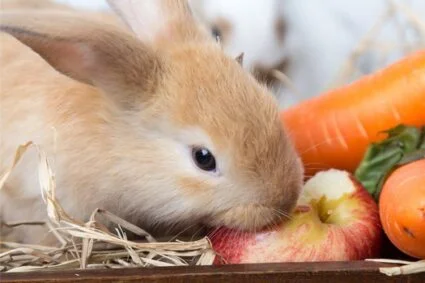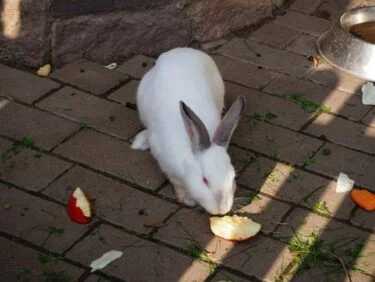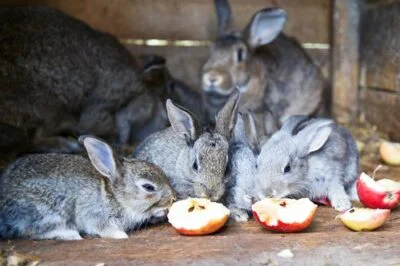Rabbits enjoy fresh vegetables and fruits as part of a balanced diet. Apples are known to be among the healthiest fruits for humans, but you may wonder if apples are healthy for rabbits.
Rabbits can eat apples with the skin, but only in moderation. Feed your rabbit only 1 or 2 slices of apple per week. Although apples are rich in flavonoids, antioxidants, and fiber, they’re also high in sugar. This can cause dental problems and obesity in rabbits.
Apples are delicious treats for rabbits. But remove the apple seeds as they contain toxic compounds called cyanogenic glycosides. Apple tree leaves, twigs, and branches are considered safe for rabbits.
Are Apples Safe for Rabbits to Eat?
All types of apples, including Fuji, red delicious, Gala, Ambrosia, Honeycrisp, Granny Smith, Golden Delicious, and McIntosh are safe for rabbits. Some rabbits may refuse to eat green apples because of their sour and bitter taste. The key is only to offer apples as treats.
Never feed a rabbit an entire fruit, especially an apple. Fruit should not make up more than 10% of your rabbit’s diet. In other words, your rabbit can only eat 1-2 tablespoons of fruit per day. When it comes to apples, the recommended amount is 1-2 slices, once a week.
Benefits of Apples for Rabbits
Apples are rich in fiber and antioxidants that are excellent for gut health. Be sure to feed your rabbits apples with the skin on as that’s where most of the fiber and antioxidants are found. Apples contain the following essential nutrients, which are excellent for rabbit health:
- Dietary Fiber. Fiber helps improve gut health and allows rabbits to produce healthy feces. A diet rich in fiber can also help fight heart disease.
- B-complex vitamins (vitamin B-6, thiamin, and riboflavin). These improve the nervous system and red blood cell health. According to the Journal of Nutrition, vitamin B-6 deficiency in rabbits can lower their growth rate, cause scaly skin of the years, convulsions, mild anemia, and sudden paralytic collapse in severe cases.
- Phytonutrients. These compounds fight free radical damage and infections.
- Calcium. Promotes stronger teeth and bones in rabbits.
- Potassium. Rabbits need potassium for maximum growth.
Why Shouldn’t Rabbits Overeat Apples?
Fruits, including apples, should be limited to around 1 teaspoon per 1 lb. of a rabbit’s body weight.
Apples are highly acidic and rich in plant sugar. The high acidic content makes apples damaging to a rabbit’s teeth. However, just a couple of pieces per week shouldn’t hurt your rabbit’s dental health.
Because apples have high sugar content, they can lead to digestive issues and obesity in rabbits. Don’t let your rabbit overeat high-sugar fruits, such as apples.

Rabbits produce vitamin C naturally in their bodies. Too much vitamin C in a rabbit’s diet can contribute to kidney damage. Rabbits have delicate stomachs and too much fruit in a rabbit’s diet can contribute to stomach aches and diarrhea.
The basic foundation of a balanced diet for rabbits has to be grass hay, including oat and timothy hay. Hay should make up at least 80 to 90% of a rabbit’s diet. The remaining 10-20% should be allocated towards fruits and vegetables. Ideally, no more than 10% of your rabbit’s diet should consist of fruits, such as apples.
Can Rabbits Eat Apple Seeds And Stems?
Apple stems and apple seeds shouldn’t be fed to a rabbit. The stems and seeds of apples contain poisonous compounds, called cyanogenic glycosides. Therefore, you must always cut apples into slices very carefully, ensuring no seeds or stems are present.
Although the cyanide in apple pips and stems are toxic to animals, there aren’t any reported cases on rabbits being seriously harmed by eating a few apple seeds. The toxin is protected by the hard coating of the seed, which often passes straight through the digestive tract of most animals.
However, there is a chance that your rabbit may chew the seeds, causing the contents to be released in the gut. Fortunately, cyanide in minute quantities is typically detoxified in the body.
Even though this suggests that a couple of seeds or a piece of stem that enters your rabbit’s belly by mistake may not hurt your pet, it is important to practice due diligence to be on the safe side. Not all rabbits react to food in the same way.
Cyanide in larger quantities is poisonous to rabbits and can trigger the following symptoms:
- Stomach upset
- Diarrhea
- Reduced heart rate
- Convulsions
- Respiratory congestion
In severe cases, eating apple seeds and stems can be life-threatening to pets.
Can Rabbits Eat Apple Skin?
Apple skin is the most nutritious part of an apple for rabbits. Most of the fiber and antioxidants in apples are found in their skin.
Just be sure to wash your apples thoroughly to remove any pesticides and chemicals before feeding them to your rabbits. Purchase organic apples as they’re likely to be lower in chemicals compared to conventional apples.
Can Rabbits Eat Apple Tree Leaves, Twigs, and Branches?
Apple tree leaves, twigs, and branches are not only safe, but they’re also healthy and fun for rabbits. Therefore, you may feed your rabbit apple tree leaves during the summertime and apple tree twigs and branches in the winter.
Rabbits are used to eating branches and twigs in the wild. These are among the few sources of nutrition for rabbits in the colder months of the year when fresh foliage is scarce.
Your rabbit will also enjoy gnawing on apple twigs and branches as they will help your pet wear down its teeth. Rabbit teeth never stop growing and if left uncontrolled, can grow into the jaw and face, causing fatal infections. Foods such as hay and twigs can help wear down your bunny’s teeth, thereby controlling their growth.
Just make sure you wash the leaves, twigs, and branches thoroughly before offering them to your rabbit. You must also watch out for chemicals and pesticides that are often sprayed onto apple trees and their soils.
Are Rabbits Allowed Apple Juice?
Water is the best beverage for rabbits. Having said that, if you are trying to encourage your rabbit to drink more water, adding a little apple juice to its water is okay.
Make sure you count the apple juice as part of its fruit for the day or week. Apple juice is high in fruit sugar and acid; therefore, do not overdo it. Too much fruit juice can cause obesity and dental problems in rabbits.
Avoid giving your rabbits store-bought, processed and packaged apple juices as they are too high in sugar, even if they’re labeled as 100% pure.
Can Rabbits Be Allergic to Apples?
When introducing new food to your rabbit’s diet, make sure you to it slowly over a few weeks to prevent digestive reactions. The following are signs and symptoms of an allergic reaction in rabbits:
- Sneezing (dry sneezing without discharge)
- Red, inflamed and watery eyes
- Drooling (wet chin)
- Clear discharge from the nose
- Constant rubbing of the face (your rabbit may use its paws or rub its face against the ground)
Each rabbit is different, and one may not be able to tolerate certain foods. Such foods may be completely safe and healthy in general, but what works for one rabbit may not work for another.
Make sure you give a small amount of any new food and wait for 24 hours. If your rabbit has diarrhea or produces soft feces, try an alternative after its poop returns to normal. Wait for 5 to 7 days before adding any other food.
Always wash your rabbit’s food thoroughly and do not feed plants, fruits and vegetables from unknown sources or that contain high levels of pesticides.

How To Give Rabbits Apples?
Apples can only be given to rabbits as an occasional snack. Follow these steps if you want to offer an occasional apple treat to your rabbits:
- Wash the apple thoroughly. Many apples are covered in pesticides and chemicals. Always buy fresh and if possible, organic apples and wash them properly before feeding them to your pet. Not washing apples can lead to severe illnesses.
- Cut the apple into small portions. If this is your rabbit’s first time eating apples, offer it a tiny piece. Rabbits can be fed a maximum of 2 tablespoons of fruit per week.
- Watch out for any reactions. If this is your rabbit’s first time eating apples, start slow and look out for any changes in its poop. Stop feeding your rabbit apples if its poop is too soft following consumption.
- Remove the core, seeds, and stems. These aren’t safe for rabbits as they contain cyanogenic glycosides (amygdalin). If you feed your rabbit a seed or two by accident, do not worry. Apple seeds and stems are poisonous if eaten too often or in large quantities.
Never offer cooked apples to your rabbits. Cooked apples lack fiber, are full of sugar and are quite starchy. This can cause diarrhea, stomach upset and obesity in the long-term. Therefore, you must always feed raw apples to rabbits. Highly processed or packaged apple juices are also not recommended for this reason.
Be especially careful with tart apple varieties, such as crabapples. These contain high concentrations of cyanide in their core and seeds, which can be harmful to rabbits even in small amounts.
While green apples are safe for rabbits, some rabbits may refuse to eat them because of their sour and bitter taste. Understand that each rabbit is different.
Are Apples Safe for Baby Rabbits?
Rabbit nutrition for baby and young rabbits are different from adult ones. Apples are not safe for newborn baby rabbits because their digestive tracts are still developing. They are not going to be ready for solid food until they reach a certain age.
Like all mammals, a baby rabbit’s diet will only consist of its mother’s milk, which is high in nutrients and energy. Baby rabbits will continue drinking their mother’s milk until they are around 6-8 weeks.
You will have to be careful with young rabbits that are weaning as their digestive system is still very sensitive. They have to get used to adult food gradually to prevent any unwanted reactions. Rabbit babies will often eat hay at 2-3 weeks of age and other solid foods at 3-4 weeks.
Once your rabbit is around 3 months old, you can start introducing new foods slowly into its diet. Offer only a tiny amount of apple to your young rabbit, until it gets used to it. Always keep a lookout for unusual signs that may indicate your rabbit is sick.
If you notice anything unusual in your rabbit’s behavior or poop, stop feeding your rabbit apples and see a vet as soon as possible.
Can Wild Rabbits Eat Apples?
Wild rabbits should not eat sugary fruits, such as apples and tomatoes. Even carrots aren’t considered suitable for wild rabbits.
Rabbits in the wild prefer branches, twigs, dry and fresh grasses, and plants. Vegetables and fruits from the supermarket are too concentrated in energy, sugar, and nutrients for a wild rabbit’s needs.
Any rabbit, including wild rabbits, requires high fiber and low energy foods, such as hay, twigs, and branches as it helps wear down their teeth. Low-energy foods also prevent rabbits from getting overweight.
Introduce new foods slowly to your rabbits. Rabbits, especially wild rabbits, have highly sensitive stomachs that need time to adapt.


Thanks. So well organized and informative. I have been throwing store quality apples to jackrabbits 🐇 here in Marin County, Ca. I guess I’ll slack off on that a bit.